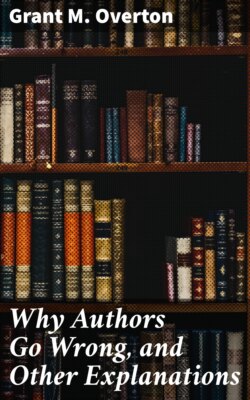Читать книгу Why Authors Go Wrong, and Other Explanations - Grant M. Overton - Страница 12
На сайте Литреса книга снята с продажи.
9
ОглавлениеTable of Contents
At this juncture we seem to hear exasperated cries of this character: “What do you mean by saying that an author must write for money first and last and yet must have a stern moral purpose? How can the two be reconciled? Why must he think of money until he begins to write and never after he begins to write? We understand why the moral object must not obtrude itself, but why need it be there at all?”
Can a man serve two masters? Can he serve money and morality? Foolish question No. 58,914! He not only can but he always does when his work is good.
A painter—a good painter—is a man who burns to enrich the world with his work and is determined to make the world pay him decently for it. A good sculptor is a man who has gritted his teeth with a resolution to give the world certain beautiful figures for which the world must reward him—or he will know the reason why! A good corset manufacturer is a man who is filled with an almost holy yearning to make people more shapely and more comfortable than he found them—and he is fanatically resolved that they shall acknowledge his achievement by making him rich!
For that’s the whole secret. How is a man to know that he has painted great portraits or landscapes or carved lovely monuments or made thousands shapelier and more easeful if not by the money they paid him? How is an author to know that he has amused or instructed thousands if not by the size of his royalty checks? By hearsay? By mind reading? By plucking the petals of a daisy—“They love me. They love me not”?
Every man can and must serve two masters, but the one is the thing that masters him and the other is the evidence of his mastery. Every man must before beginning work fix his mind intently upon the making of money, the money which shall be an evidence of his mastery; every man on beginning work and for the duration of the work must fix his mind intently and exclusively on the service of morality, the great master whose slave he is in the execution of an Invisible Purpose. And no man dare let his moral purpose expose itself in his work, for to do that is to do a presumptuous and sacrilegious thing. The Great Moralizer, who has in his hands each little one of us workers, holds his Purpose invisible to us; how then can we venture to make visible what He keeps invisible, how can we have the audacity to practice a technique that He Himself does not employ?
For He made the world and all that is in it. And He made it with a moral end in view, as we most of us believe. But not the wisest of us pretends that that moral object is clearly visible. It does not disclose itself to us directly; we are aware of it only indirectly; and are influenced by it forevermore. If the world was so made, who are we that think ourselves so much more adroit than Him as to be able to expose boldly what He veils and to reveal what He hath hidden?
There are those, of course, who see no moral explanation of the universe; but they are not always consistent. There is that famous passage of Joseph Conrad’s in which he declines the ethical view and says he would fondly regard the panorama of creation as pure spectacle—the marvellous spectacle being, perchance, a moral end in itself. And yet no man ever wrote with a deeper manifestation and a more perfect concealment of his moral purpose than Conrad; for exactly the thing to which all his tales are passionate witnesses is the sense of fidelity, of loyalty, of endurance—above all, the sense of fidelity—that exists in mankind. Man, in the Conradist view, is a creature of an inexhaustible loyalty to himself and to his fellows. This inner and utter fidelity it is which makes the whole legend of Lord Jim, which is the despairing cry that rings out at the last in Victory, which reaches lyric heights in Youth, which is the profound pathos of The End of the Tether, which, in its corruption by an incorruptible metal, the silver of the mine, forms the dreadful tragedy of Nostromo. An immortal, Conrad, but not the admiring and passive spectator he diffidently declares himself to be!
